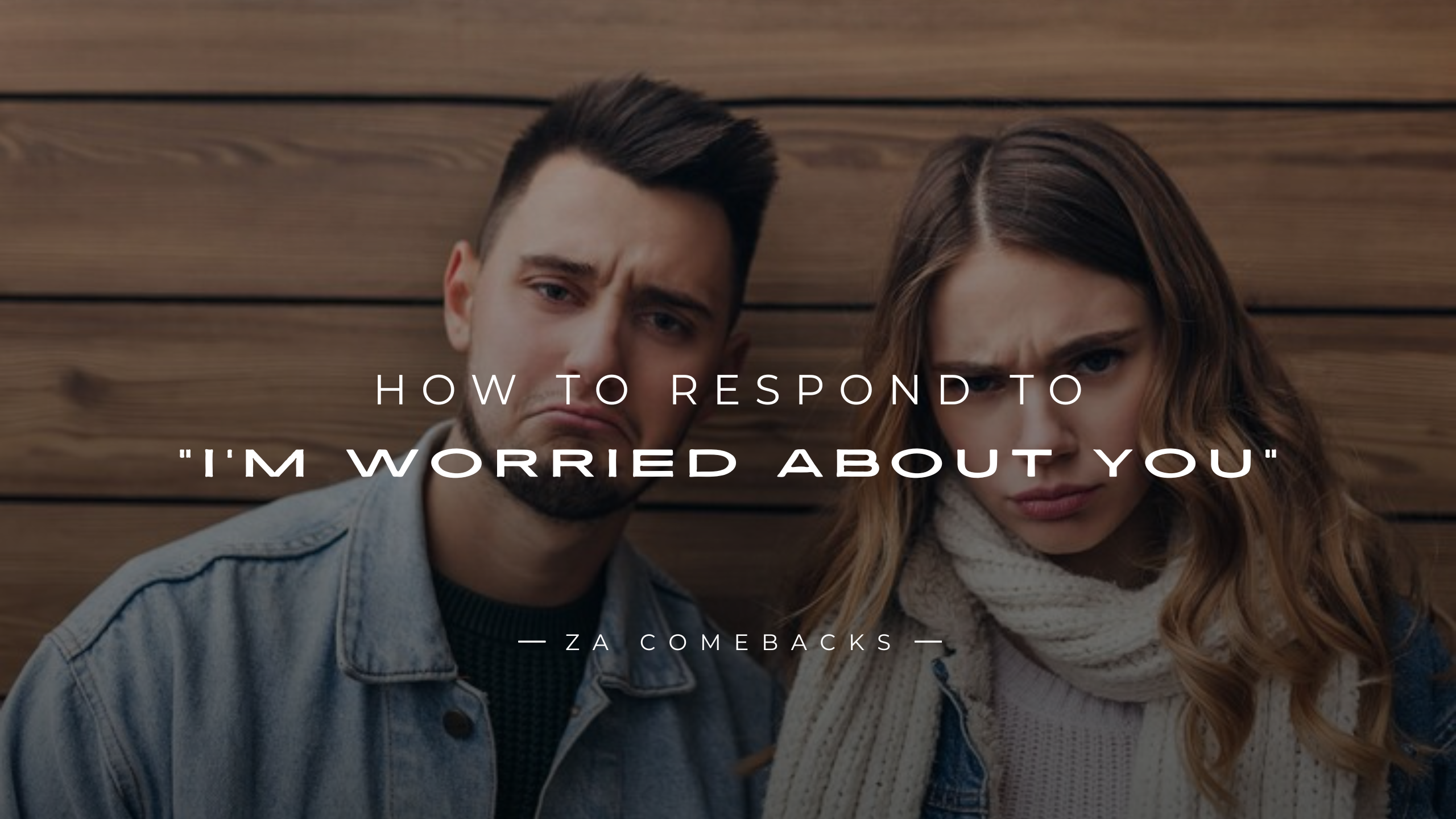Have you ever heard someone say, “I’m worried about you,” and felt your stomach drop a little? It’s a heavy phrase. Whether it’s from a friend, family member, or colleague, it often leaves us grappling with a mix of emotions. In this article, we’re going to explore how to respond to this statement, making sure you handle it with care and understanding, while also protecting your own emotional space.

150+ Replies to “I’m Worried About You”
Reassuring Responses
- Thank you for your concern, but I’m doing alright. I’ve got everything under control.
- I appreciate you worrying about me, but I’m not in any danger.
- It means a lot that you’re concerned, but I’m okay. I’m just going through a tough time.
- I know you’re worried, but I promise I’m getting through it.
- I’ve been through worse, and I’m handling this just fine.
- I’m taking it day by day, but I’m managing. Don’t worry too much.
- I’m doing okay. I’m just a bit overwhelmed right now, but I’ll be fine.
- It’s kind of you to worry, but I’m staying positive and handling things.
- I’m okay, I just need a little time to adjust. Thanks for being concerned.
- I’m managing, and everything is slowly getting better. Thanks for checking in.
Grateful Responses
- Your concern really means a lot to me. Thank you for being there.
- I’m so thankful that you care enough to be worried. It’s comforting.
- I can’t tell you how much I appreciate your support. It really helps me feel less alone.
- Thank you for worrying about me. I’m lucky to have someone like you in my corner.
- Your concern touches me deeply. I’ll get through this with people like you supporting me.
- I feel so blessed to have you looking out for me. Thank you for your care.
- I know you’re worried, and I’m so grateful to have someone like you who cares.
- Thank you for being here for me. Your support makes all the difference.
- It means a lot that you’re thinking about me, thank you for being so kind.
- Your worry is something I appreciate. It’s a reminder that I’m not alone in this.
Acknowledging the Concern
- I can tell that you’re worried, and I appreciate how much you care.
- I know you’re concerned, and that really matters to me.
- I understand why you’re worried; I’m not feeling like myself lately.
- It’s hard to hear that you’re worried, but I know it comes from a place of love.
- I see that you’re concerned, and I’m grateful that you care enough to notice.
- I know you’re worried, and it’s comforting to know you’re there for me.
- I appreciate you being worried about me, and I can assure you, I’m trying to be okay.
- I can feel your concern, and it makes me feel less alone in this.
- I know this isn’t easy to see, but I’m doing what I can to get better.
- I can see why you’d be worried, and I’m working through things with care.
Deflecting or Downplaying Responses
- It’s not as bad as it looks, really. I’m just a little overwhelmed right now.
- I’m fine, nothing to worry about! I’m just dealing with a few things.
- I’m not in any real danger, just a bit stressed. It’s no big deal.
- Don’t worry about me too much. I’m just going through a rough patch.
- It seems worse than it is, I promise. I’m handling it okay.
- I’m doing fine, just a little off track for now, but I’ll get back on course soon.
- It’s nothing serious, really. I’m just taking a little time to get myself together.
- I’m okay, really. I’m just not in the best mood, but it’s temporary.
- No need to worry, it’s just one of those days. I’ll bounce back quickly.
- It’s not as scary as you think. I’ll figure it out, don’t worry.
Explaining or Justifying Responses
- I’ve been going through a lot lately, but I’m trying to get a handle on things.
- There’s just a lot on my plate right now, and it’s hard to keep up with everything.
- I’ve been under a lot of stress at work and with personal stuff, but I’m getting through it.
- I’ve been feeling drained lately, but I’m trying to take things one day at a time.
- I’ve been going through some changes, and it’s affecting my mood, but I’m working on it.
- There are some things I’m dealing with, but I have plans in place to get back on track.
- I’ve been focusing on self-care, but sometimes it takes a little longer to feel like myself again.
- I’m juggling a lot of things right now, but I’m taking steps to get back to normal.
- I’ve had some setbacks, but I’m doing what I can to handle them.
- I’m just going through a difficult time, but I’m staying positive and taking care of myself.
Confessing Vulnerability
- I’m really struggling, and I’m not sure how to get through it right now.
- Honestly, I’m feeling lost and don’t know how to make things better.
- I’m scared and unsure about how to handle everything on my own.
- I’ve been feeling pretty overwhelmed, and I don’t know how to handle it all.
- I’m not doing as well as I’d like, and I’m afraid it’s taking a toll on me.
- I’m really struggling with this, and I don’t know how to get out of this funk.
- I’ve been feeling very vulnerable lately, and it’s hard to admit that.
- I feel like I’m failing and it’s hard to keep up the facade of being okay.
- I’m really scared about what’s going on, but I’m trying not to show it.
- I don’t have all the answers right now, and it’s making me feel pretty lost.
Seeking Support
- I could really use someone to talk to right now, if you’re available.
- Could you please just listen to me for a bit? I need to vent.
- I’m really struggling, and having someone to lean on would mean the world to me.
- Do you mind if I reach out for support? I’m having a tough time handling things alone.
- I’m not sure how to get through this by myself; can we talk?
- I could really use your help right now, even if it’s just to talk things through.
- I need a bit of guidance, do you have any advice for me?
- Could we sit down and talk? I feel like I’m drowning in everything.
- I’ve been feeling isolated, and it would mean a lot to have your support.
- I don’t know what to do next, but your support would be a big help.
Requesting Space
- I need a little time to myself right now to process things.
- I really appreciate your concern, but I just need some space to think.
- I’ll be okay, I just need some alone time to work through this.
- Can I have some time alone? I need to clear my head.
- I know you’re trying to help, but I just need to be by myself for a while.
- Thank you for caring, but I need to work through this on my own for a bit.
- I’m grateful for your worry, but I think some time alone will help me sort things out.
- I just need a little quiet time to gather my thoughts. I’ll be fine.
- I appreciate you being here, but I need some time to recharge before I can talk more.
- I think I need to be alone right now. I’ll reach out when I’m ready.
Humorous or Lighthearted Responses
- Don’t worry, I’m just practicing for a role as a professional overthinker!
- If I were any more worried about myself, I’d start charging myself rent!
- You know what they say, worrying is my cardio for the day!
- I’m just in a temporary panic mode. I promise to be back to my usual calm self soon!
- I’m fine, I just like to look dramatic for effect—keeps life interesting!
- No need to worry, I’m just building up stress for a new workout routine!
- I swear I’m okay, I just had one too many cups of coffee this morning.
- Don’t worry, I’m just waiting for my inner superhero to kick in and save the day.
- Everything’s fine! I’m just trying to set a world record for the most anxious thoughts in one day!
- Don’t stress, I’m just preparing for a role as ‘the one who needs help’ in a dramatic movie scene!
Expressing Frustration
- I don’t need everyone to worry about me all the time. I can handle things.
- I’m tired of hearing people tell me they’re worried about me. I’m doing the best I can!
- I get that you’re worried, but I just wish people would trust me more.
- I know it looks bad, but it’s just a phase. I’m working through it.
- Honestly, it’s frustrating when everyone thinks I can’t handle things on my own.
- I’m trying my best, but it feels like no one believes I can figure things out.
- It’s exhausting having to reassure everyone all the time. I’m fine, I promise!
- I don’t need the extra pressure right now; I’m already stressed enough.
- I’m tired of people treating me like I’m fragile. I can deal with this!
- I’m doing the best I can, and it’s frustrating when everyone thinks I’m falling apart.
Reassuring with Future Plans
- I know it’s tough now, but I have a plan in place to get things back on track.
- I’m working on some changes, and things will be better soon. Just give it some time.
- I’ve already started taking steps to improve the situation, and I’m optimistic about the outcome.
- I’ve made a few plans, and I’m confident things will start looking up soon.
- Things might be challenging right now, but I’m focused on the future and making progress.
- I’m not where I want to be yet, but I’ve got a roadmap to get there.
- I’m committed to making things better. It’ll take some time, but I’m confident in my plan.
- I know things seem rough, but I’ve got a solid plan to make things work out.
- I’ve got some positive steps ahead, so hang tight. Better days are coming.
- I’m not where I want to be yet, but I’m working toward a brighter future.
Denial or Avoidance
- I don’t know why you’re worried, I’m fine—just a little tired, that’s all.
- There’s nothing to worry about, really. Everything’s fine on my end.
- I don’t know what you’re talking about, there’s nothing wrong.
- I’m not sure why you think something’s off. Everything is going great.
- I’m fine. Nothing to see here, just a little stressed, but it’s no big deal.
- I’m not worried at all, so you shouldn’t be either.
- There’s nothing wrong, I’m just dealing with a little bit of stress. It’ll pass.
- Honestly, I don’t know why everyone thinks there’s something wrong. It’s all good.
- I’m not in a crisis, it’s just a temporary thing. Don’t worry so much!
- I’m handling things, really. You don’t need to worry about me.
Empathetic Responses
- I understand why you’re worried, and I truly appreciate how much you care about me.
- I know you’re just trying to look out for me, and it means the world that you’re concerned.
- I can see how worried you are, and it really touches me that you care so much.
- It’s comforting to know you’re there for me when I’m going through a tough time.
- I understand that it’s hard to see me struggle, but I’m doing my best to manage it.
- I can feel your concern, and it’s really comforting to know that you care.
- It’s not easy seeing someone you care about go through this, but I’m trying to keep my head up.
- I really appreciate your empathy. It makes a world of difference when I’m feeling this way.
- I know it’s tough to watch me go through this, but I’m grateful for your support.
- I understand how worried you must be, and I’m truly thankful for your care and understanding.
Redirecting the Focus
- I appreciate your concern, but how are you doing? I want to hear about your day.
- I know you’re worried about me, but let’s focus on something positive for now.
- I’m fine, but let’s talk about something else. How’s your work going?
- I get it, but let’s not focus on me right now. Tell me about what’s been going on with you.
- I’m handling things, but I’d love to know how you’re doing lately.
- Thanks for worrying about me, but let’s change the subject for a bit. How are you?
- I’m managing, but enough about me. I want to hear how you’re feeling.
- I know you’re concerned, but let’s talk about something fun to get our minds off of it.
- I’ll be okay, but I want to know how things have been going for you!
- I appreciate it, but let’s talk about something else to take my mind off things.
Trying to Offer Comfort
- I know you’re worried, but you don’t have to be. I’m taking care of myself.
- I’m okay, and I’ll get through this with time. You don’t need to stress.
- I appreciate you worrying, but I’m working through it, and things will get better.
- It’s sweet of you to worry, but I promise I’m staying positive and doing what I can.
- I’m going through a tough time, but I’m keeping my head up and moving forward.
- I know things are tough right now, but I’m strong enough to get through this.
- I appreciate your care, and I’m doing everything I can to take care of myself.
- I’m not in the best place, but I know things will improve soon. Thanks for being here.
- I’m trying to stay positive, and I’ll be okay. Your support helps more than you know.
- Things will get better with time. I’ve got this, and your support means everything.
What Does “I’m Worried About You” Really Mean?
When someone tells you they’re worried about you, it’s crucial to understand the emotional context behind it. This phrase usually signifies that the person is concerned for your well-being—whether it’s your mental health, physical health, or emotional state. It can also point to their perception that something might be off, even if you don’t agree with them.
The motivations for saying “I’m worried about you” can vary widely. For some, it’s a sincere expression of concern. For others, it might stem from overprotectiveness or miscommunication. Regardless, it’s important to approach these words with patience and clarity.
The Impact of Hearing “I’m Worried About You”
At first glance, hearing “I’m worried about you” might seem like a straightforward statement, but it can trigger a range of emotions. You might feel relieved, appreciated, or even irritated. It’s not uncommon to feel defensive, especially if you don’t think there’s anything to worry about.
Psychologically, this phrase can make you feel exposed, as though you’re being scrutinized. If you’re already struggling with something, such as anxiety or depression, it could make you feel even more vulnerable.
Why Some People Might Say “I’m Worried About You”
Before reacting, it’s essential to consider why someone might say they’re worried about you. Here are a few potential reasons:
- Genuine Care and Concern: Most often, this is the reason behind the statement. They want to ensure you’re okay and may feel a bit anxious about your well-being.
- Overprotectiveness or Control: Some people, especially family members or close friends, can be overbearing in their care. They may say “I’m worried about you” because they feel the need to protect you at all costs, even if it’s not necessary.
- Misinterpretation of Your Behavior: Sometimes, people say this because they’ve noticed a change in your behavior or habits, which they might not fully understand. It could be your response to stress, work, or personal challenges.
The First Step: Take a Deep Breath
When someone tells you they’re worried about you, the first thing you should do is take a deep breath. Don’t rush into a response, especially if your emotions are running high. Taking a moment to collect your thoughts ensures that your answer is thoughtful, measured, and not driven by immediate emotions like frustration or guilt.
How to Respond to “I’m Worried About You”
Now that you’ve calmed down, how should you respond? The key is to be honest, clear, and respectful. Your response will depend on the context of the conversation and your current emotional state.
If You Are in a Tough Spot
If you’re dealing with something tough, whether it’s a mental health challenge or personal issue, acknowledge the concern. Let the person know you appreciate their care, but it’s okay to express that you’re working through it in your own way.
- Acknowledge your struggles: “I’m going through a lot right now, and I appreciate you noticing.”
- Express gratitude for their concern: “Thanks for checking in on me. It means a lot.”
- Offer reassurance while setting boundaries: “I’m handling it, but I’ll let you know if I need support.”
If You Are Feeling Overwhelmed
If you’re feeling overwhelmed, it’s important to express that clearly but without guilt. Sometimes people worry because they don’t realize how much you’re juggling.
- Gently explain the overwhelm: “I’ve got a lot on my plate right now, and I’m doing my best to manage everything.”
- Ask for space or understanding: “I might need some time to process everything, but I appreciate your support.”
If You Are Feeling Confused or Misunderstood
If you’re confused about why the person is worried or feel like they’re not seeing things clearly, it’s okay to ask for clarification. Gently communicate your perspective without dismissing their concerns.
- Seek clarification: “I understand you’re worried, but I’m not sure what’s making you feel that way.”
- Discuss better ways they can support you: “I think I’d feel more supported if we could talk about what’s going on in a bit more detail.”
How to Respond in Specific Scenarios
Sometimes, “I’m worried about you” comes at times when you feel unsure of how to respond. Here are a few specific scenarios:
- When you’re going through a difficult period: Be honest about your struggles and communicate what you need from the person. Whether it’s advice or just a listening ear, let them know.
- When you’re not ready to talk yet: It’s okay to let the person know you’re not ready to discuss things fully. Simply say, “I appreciate your concern, but I’m not ready to talk about it just yet.”
- When you have no idea why they’re worried: If the concern seems unfounded or confusing, ask for more details. “I’m not sure what’s making you worry, but let’s talk about it.”
How to Handle the Concern of Overprotective Friends or Family
Overprotective friends or family might constantly say they’re worried about you, even when there’s no immediate danger. It’s important to set healthy boundaries in these situations. Politely remind them that you’re capable of handling things on your own and that their care, though appreciated, might feel overwhelming at times.
Communicating Your Needs
One of the best ways to handle someone’s concern is to communicate your own needs. Let them know what type of support you’d appreciate—whether that’s space, understanding, or practical help. Setting clear expectations can prevent misunderstandings and build a stronger, more supportive relationship.
When It’s Okay to Seek Help from Others
There are times when you might feel overwhelmed and unsure of how to respond effectively. It’s okay to seek help from a therapist, counselor, or trusted individual who can offer guidance on navigating these situations. Sometimes, external support can provide clarity and perspective.
How to Maintain Your Mental Health in These Situations
Amid all of this, don’t forget to prioritize your mental health. Managing your emotions, setting boundaries, and seeking support are all crucial for maintaining your well-being. Take time for self-care, whether it’s through journaling, meditation, or simply taking a break.
Conclusion
In conclusion, knowing how to respond to the phrase “I’m worried about you” can make a big difference in supporting meaningful conversations with those who care about you. Whether it’s reassuring them, acknowledging their concern, or opening up about your feelings, the right response can strengthen your bond. Remember, it’s all about creating a space for understanding and emotional connection. If you’re looking for more guidance on navigating emotional exchanges, be sure to check out our blog on How to Reply to “Holding Up Well” – 150+ Replies here, offering additional insights into handling sensitive conversations with ease.
FAQs
Q. What should I say if I don’t want to open up right away?
I’m not ready to talk yet, but I appreciate your concern.
Q. How can I respond if I’m feeling judged but the person means well?
I know you care, but I’d prefer if we talked about this later when I feel ready.
Q. How do I express that I’m fine when I’m not?
I’m going through something right now, but I’ll reach out when I need help.
Q. Should I feel guilty if I don’t share my personal struggles?
No, it’s okay to set boundaries and take time to process things on your own.
Q. How can I set boundaries with someone who constantly worries about me?
I appreciate your concern, but I need some space to handle things in my own way.









